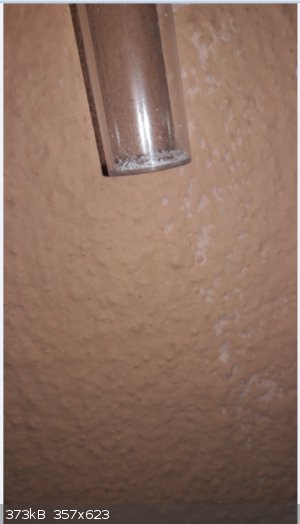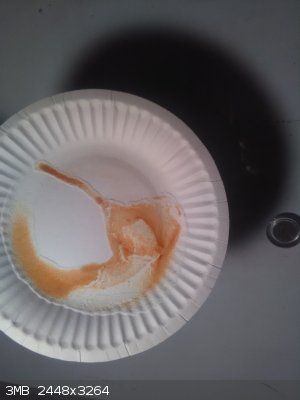| Pages:
1
2 |
symboom
International Hazard
    
Posts: 1143
Registered: 11-11-2010
Location: Wrongplanet
Member Is Offline
Mood: Doing science while it is still legal since 2010
|
|
Tiny success
Ive made zinc peroxide
Very tiny amount was made this stuff is stuborn to form I have finger nail amount like 10 mg
My process
Tetramine zinc sulfate from reacting zinc sulfate with ammonia
Until it desolves
The solution is chilled
And so is the hydrogen peroxide
Solutions are mixed and the solution turns yellow its hard to see the percipitate
Yellow powder is obtained
Next attempt ill just add peroxide first
Thatway when the precipitate forms it will have peroxide already there
[Edited on 12-10-2016 by symboom]
[Edited on 12-10-2016 by symboom]
|
|
|
symboom
International Hazard
    
Posts: 1143
Registered: 11-11-2010
Location: Wrongplanet
Member Is Offline
Mood: Doing science while it is still legal since 2010
|
|
Quote: Originally posted by AJKOER  |
Here is but a small extract from Atomistry.com on ZnO2 on a much larger discussion of Zinc peroxide based on extracts from the literature (link: http://zinc.atomistry.com/zinc_peroxide.html ), which the reader should note includes dated research:
"Thenard obtained an incompletely peroxidised oxide of zinc by (a) dissolving zinc hydroxide in hydrochloric acid containing hydrogen peroxide and
precipitating with an alkali hydroxide; (b) acting on gelatinous zinc hydroxide with hydrogen peroxide. "
Now, Zn(OH)2 + [2 HCl + 2 H2O2] is, in my opinion, not necessarily the same as ZnCl2 (aq) + H2O2. The reason is due to the unspecified concentration
of the HCl in question, for one, as for dilute HCl:
HCl (dilute) + H2O2 --> HOCl + H2O
This reaction is cited by Watt's as one of several preparations for Hypochlorous acid. To quote from "Watts' Dictionary of chemistry", page 16. "—6.
Addition of H2O2 Aq (containing 2.45 p.c. H2O2) to a large excess of Cl Aq produces HClOAq, according to Fairley (B. A. 1874, 57); if much H202 is
added, the HClO Aq is decomposed forming HCl Aq, H20, and evolving O." Link: http://books.google.com/books?pg=PA13&dq=Watt+preparatio...
But, with concentrate HCl, the interaction of HCl and Hypochlorous acid forms chlorine water:
HCl + HOCl = Cl2 + H2O (see http://books.google.com/books?id=zVIpX7rkk7oC&pg=PA15&am... )
In addition, with respect to the ZnCl2, if subject to concentration by evaporation, for example, the products could include say, ZnCl2.ZnO, but based
on recent work, more correctly, a tetrabasic zinc chloride, ZnCl2.4Zn(OH)2.H2O (see Wikipedia article on Zinc chloride hydroxide at http://en.wikipedia.org/wiki/Zinc_chloride_hydroxide_monohyd... ). My speculation is that perhaps the later compound, upon be reacted upon by the
H2O2 or HOCl, may be the source of the ZnO2.
------------------------------------------------------------------------
Here is another source, previously quoted in part below and also somewhat dated, available at http://tera-3.ul.cs.cmu.edu/NASD/4dcb85c3-9fee-4c83-9e6d-fe6... to quote:
"J. F. Eijkman boiled a soln. of zinc sulphate, which had been treated with enough aq. ammonia to dissolve the precipitate first formed, with30 per
cent, hydrogen peroxide. The pale-yellow granular precipitate is stable up to nearly 130°. It is soluble in aq. sodium hydroxide with the evolution
of oxygen; it explodes when heated to about 212°"
[Edited on 7-2-2014 by AJKOER] |
From what I gather its the reaction already containing peroxide
So if my ammonia has hydrogen peroxide already in it although that cant work because it reacts with it
[Edited on 12-10-2016 by symboom]
[Edited on 12-10-2016 by symboom]
|
|
|
ch3misc00l
Harmless

Posts: 16
Registered: 8-10-2015
Location: Costa Rica
Member Is Offline
Mood: No Mood
|
|
I have made zinc peroxide using sodium zincate and hydrogen peroxide. It forms as a colloid-like precipitate that is almost pure ZnO2, but it is
whitish and not yellow. Still it does burn making a green flame and forming zinc oxide as a gas that stained my burner white.
|
|
|
ch3misc00l
Harmless

Posts: 16
Registered: 8-10-2015
Location: Costa Rica
Member Is Offline
Mood: No Mood
|
|

A sample of pure ZnO2, made by Na2Zn(OH)4 + H2O2 method. It's almost white but it has a slight yellow to it.
I made this sample from a test run.
[Edited on 23-12-2016 by ch3misc00l]
|
|
|
Yamato71
Hazard to Self
 
Posts: 68
Registered: 8-2-2012
Member Is Offline
Mood: Resigned
|
|
Back in the day, lab methods for the production of concentrated H2O2 as well as metallic and organic peroxides often made use of the extreme
insolubility of barium sulfate in water. Starting with barium peroxide, almost any other peroxide may be synthesized by a simple metathesis reaction
with the sulfate salt of just about any cation. You want hydrogen peroxide? React your BaO2 with sulfuric acid
(BaO2 (s) + H2SO4 (l) --> H2O2 (l) + BaSO4 (s ppt)). Zinc peroxide? No problem: BaO2(s) + ZnSO4(s) --> ZnO2(s) + BaSO4(s ppt). Get the
picture?
Even though barium peroxide is only slightly soluble in water, the absolute insolubility of the product, barium sulfate drives the reaction all the
way to the right, favoring products over reactants. Since the BaSO4 precipitates and leaves the reaction mixture completely, the reaction is
irreversible. The barely soluble BaO2 will dissolve from suspension as fast as the BaSO4 precipitates. Rapid magnetic stirring helps to quickly
dissolve the reactants. The peroxide product will accumulate until it reaches saturation, then it will precipitate, but can be separated from the
BaSO4 by water extraction.. In the case of H2O2, it is miscible in all concentrations with water, so the practical upper limit of concentration is
90%-95% (the point at which it becomes dangerously unstable). Needless to say, keep it below 70%, preferably <50%.
Barium peroxide is fairly easy to make by simply roasting barium oxide at 500c in the presence of oxygen. (2 BaO + O2 --> 2BaO2). You can also use
other salts of barium as feedstock, provided they can be pyrolized to BaO. Examples include the nitrate, hydride, carbonate, hydroxide, sulfide,
hydrosulfide, sulfate, sulfite, bisulfide, bisulfite, cyanide, cyanate, etc. (Oh, and don't forget the double salts.) If you are so inclined, you
can even start with barium metal, which if I'm not mistaken, will oxidize directly to barium peroxide, in the same manner as sodium.
Y71
|
|
|
Laboratory of Liptakov
International Hazard
    
Posts: 1335
Registered: 2-9-2014
Location: Technion Haifa
Member Is Offline
Mood: cool.gif
|
|
H2O2
It seems that here I see information about preparation H2O2 high concentration. Maybe best information, respectively very easy preparation. Thus is
possible prepare almost pure H2O2 any concentration ? I understand right? Acid H2SO4 is changed on neutral crystals BaSO4. Is possible thus working in
overlap adding BaO2 ?Without precise counting ? Only with pH paper ? Is possible find some method for prepare BaO2 from Ba(NO3) 2 ? Thanks,
.....LL.......
Development of primarily - secondary substances CHP (2015) Lithex (2022) Brightelite (2023) Nitrocelite (2024)
|
|
|
symboom
International Hazard
    
Posts: 1143
Registered: 11-11-2010
Location: Wrongplanet
Member Is Offline
Mood: Doing science while it is still legal since 2010
|
|
Update zinc sulfate and ammonium persulfate creates yellow solution zinc peroxide? Fine precipitate waiting for it to settle. definitely zinc
peroxide.
Here is my inspiration
https://m.youtube.com/watch?v=1_a81M9p2so
Silver nitrate and sodium persulfate
silver and zinc has some strange characteristics
Copper acually can for a peroxide but it is more tricky decomposes in water at room temperature.
Atempting same reaction except copper sulfate must be complexed with ammonium hydroxide
Ive tried this reaction with oxone the easier to get a hold of chemical I might try zinc oxide and oxone that might work as oxone is acidic which
could explain why it did not work or complexed with ammonium hydroxide
[Edited on 15-6-2017 by symboom]
[Edited on 15-6-2017 by symboom]
[Edited on 16-6-2017 by symboom]

|
|
|
symboom
International Hazard
    
Posts: 1143
Registered: 11-11-2010
Location: Wrongplanet
Member Is Offline
Mood: Doing science while it is still legal since 2010
|
|
A response to LL i am understand how the properties change going from Mg to Ba
magnesium peroxide
reaction with hydrogen peroxide
Calcium peroxide
Reaction with hydrogen peroxide
Strontium peroxide is interesting
Reaction with hydrogen peroxide or heating strontium oxide in pure oxygen
barium peroxide
Heating barium oxide in pure oxygen
Other preparations listed
1
Chloride and peroxide route
2
Ammonium and peroxide
3
evaporating zinc oxide or hydroxide with hydrogen peroxide
4
ZnO2.H2O by acting with 30 per cent, hydrogen peroxide on alkali zincates. It decomposed explosively at 178°
5
A similar product was obtained by dissolving zinc nitrate in concentrated ammonia solution, cooling to -5° C., adding a concentrated solution of
hydrogen peroxide, and stirring the filtered precipitate for some time with more of the hydrogen peroxide. The product was either moist ZnO2 or
ZnO2.½H2O.
6
The prolonged action of the calculated amount of 30 per cent, hydrogen peroxide solution on freshly ignited zinc oxide.
7
Commercially, zinc peroxide has been prepared by allowing barium peroxide suspended in water to act on the zinc salt of an acid that forms an
insoluble barium salt.
8
The electrolytic preparation. A solution of zinc chloride neutralised with zinc oxide, is electrolysed using a porous diaphragm, and hydrogen
peroxide is added to the cathode cell. The precipitated hydrated peroxides are carefully dried.
9
When pure zinc oxide reacts with an ethereal solution of hydrogen peroxide, the product has the composition Zn4O7.2H2O. It loses oxygen when heated
with water at 100° C., and forms Zn3O5.H2O. Both these peroxides are reddish-yellow powders that are stable under ordinary conditions and explode at
212°-216° C.
10
Mine reaction to zinc peroxide
Zinc sulfate and ammonium persulfate (peroxydisulfate)
Forms zinc peroxide and ammonium sulfate
[Edited on 22-7-2017 by symboom]
[Edited on 22-7-2017 by symboom]
[Edited on 22-7-2017 by symboom]
[Edited on 22-7-2017 by symboom]
|
|
|
AJKOER
Radically Dubious
    
Posts: 3026
Registered: 7-5-2011
Member Is Offline
Mood: No Mood
|
|
Here is a new path I am thinking about.
Paste a damp mix of ZnO and an ascorbate onto the inside of a large vessel.
Fill the vessel with singlet oxygen (from say hair bleaching strength H2O2 dripped onto TCCA).
Logic: See 'Ascorbate Reacts with Singlet Oxygen to Produce Hydrogen Peroxide', abstract at https://www.ncbi.nlm.nih.gov/pmc/articles/PMC2147043/ . I would avoid using ascorbate acid, as this would reverse the reaction back to H2O2, or
possibly more so, as interestingly there is a gas-solid reverse reaction with select acids (say dry gaseous HCl), to quote:
"1Δ‐O2 can now be made safely and efficiently from gas–solid reactions between alkali‐metal peroxides and hydrogen halides [Eq. (1)]. This
method avoids the liquid‐phase quenching and instability problems associated with the hydrogen peroxide/chlorine system."
Source: https://onlinelibrary.wiley.com/doi/abs/10.1002/1521-3773%28...
There is also a slower reaction of singlet oxygen with water producing H2O2.
[Edited on 2-5-2018 by AJKOER]
|
|
|
| Pages:
1
2 |